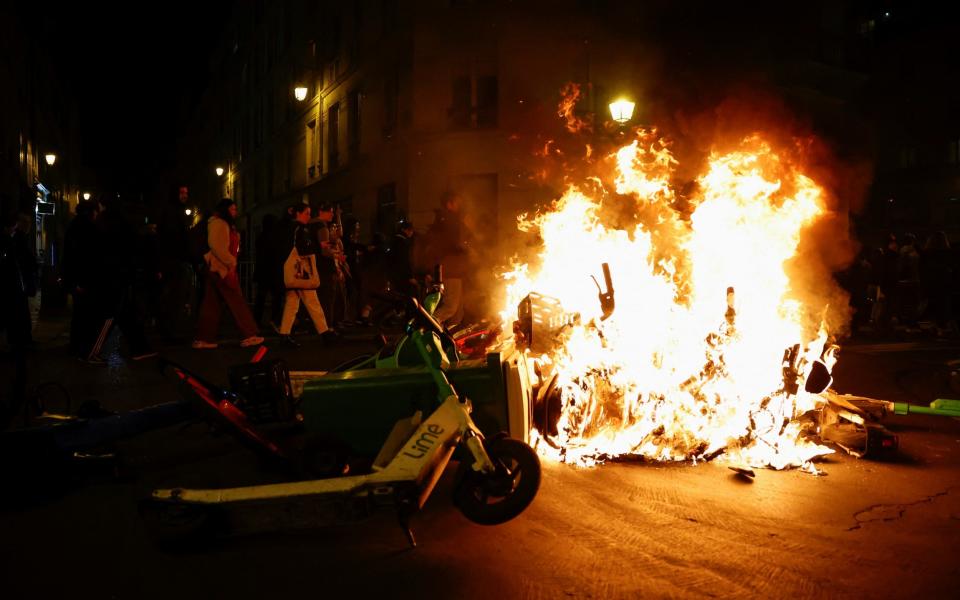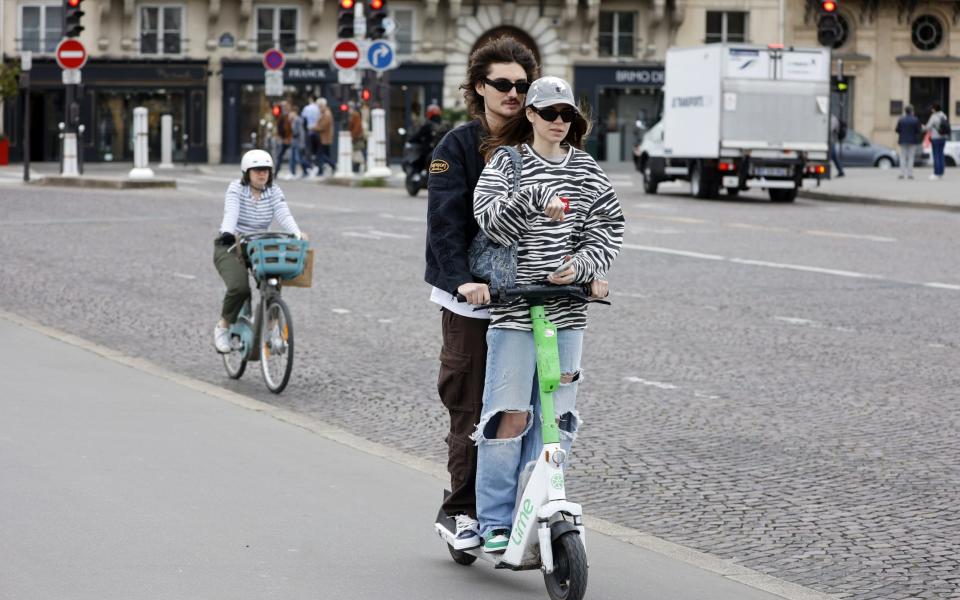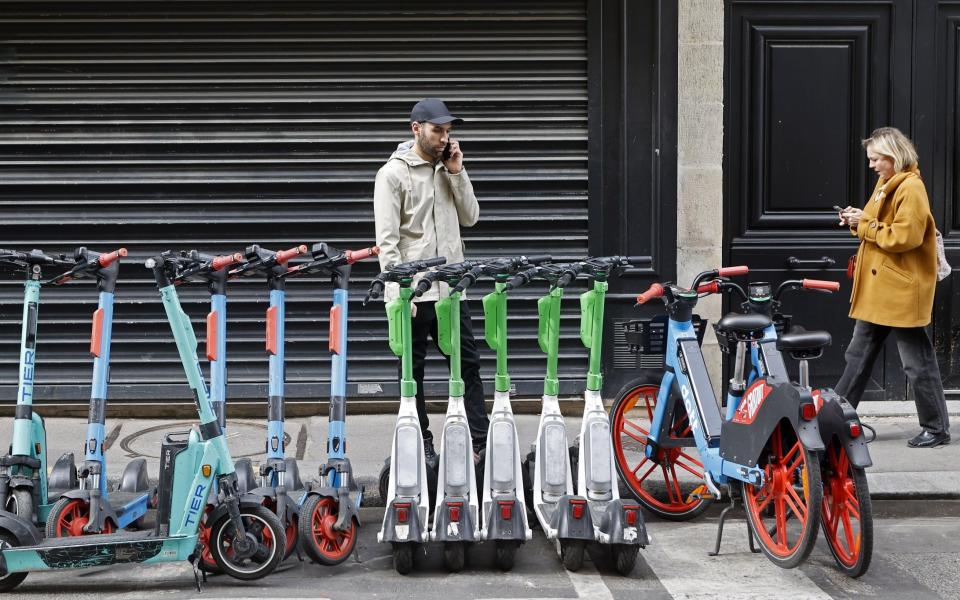How the e-scooter became Paris's burning issue

As parts of Paris went up in flames last week in the latest, and most violent protests against pension reforms, vandals fed the street bonfires with an unlikely fuel: electric scooters.
Given their ubiquity, the choice was hardly surprising. With 15,000 for-hire trottinettes électriques dotting the French capital, the pickings were rich for "black blocs" as they battled with riot police.
As the pension battle rages, this weekend dockless e-scooters will be at the heart of another burning question - albeit less literally.
On Sunday, Paris town hall will stage a referendum asking residents a simple question: “Do we or don’t we continue with free-floating rental scooters?”
Paris was among the first cities to adopt the devices that are rented via an app such as Lime, Dott or Tier.
"Symbolically the vote is very important," said Erwann Le Page, public affairs director at Tier, a Berlin-based operator. "It's a city that has been a pioneer,” he said.
Indeed, the burgeoning market for trottinettes, along with free-floating e-bikes, led Wayne Ting - boss of California-based scooter giant Lime - to last year declare the French capital "the most important city in the world for micro-mobility”.
As a result, the vote will be viewed as a litmus test in capitals around the world, including London, which is in the midst of a pilot scheme launched in June 2021 due to end this autumn. A ban would be a setback for operators and could encourage other cities to follow suit.
The consultation will not affect privately owned electric scooters, of which 700,000 were sold nationwide last year, according to transport ministry figures.
Convenient and eco-friendly to some, e-scooters are frequently dumped on pavements or tossed into the Seine and pose a danger to pedestrians, critics claim. There was one scooter-related death in Paris in 2021 and three last year, with the number of accidents rising from 353 to 459, say police.
According to a small-scale Ipsos poll for scooter operators in January, some 70 per cent of Parisians are against a ban.
But under pressure over rule-breaking on the capital's roads, Anne Hidalgo, the Paris mayor, has made no bones that she is for one.
The pro-cycling Socialist this week called them a "source of tension and worry" in the lives of Parisians.
"Inevitably, (a ban) will reduce problems," she said, questioning the scooters' sustainability.
"We take them and we throw them away whereas personal scooters are different, we can bring them home, to work, travel with them, we take care of them," she added.
However, the mayor insisted she would "respect the vote of Parisians” who seem split over the issue, often along generational lines.

At the leafy Place des Vosges, Anne Wagner, a pensioner and motorist was dead against them. “I have almost squashed scooter riders hundreds of times,” she moaned.
Her husband, François, 82, added: “Even this morning I saw two kids, young girls, together on one e-scooter. They flew past. It is dangerous. The young need to be educated about this.”
Fellow pensioner Svetla Lekarski: added: “I’m against them. They’re dangerous, too fast and above all people don’t respect the rules on parking. They put them all over the place. In Seville, I saw them all lined up neatly. Here it’s a mess.”
However, a group of 16-year-old secondary school students from Francs Bourgeois lycée in the trendy Marais district were all for keeping them.
“For us young people, they're a great plus. They really come into their own during strikes when the metro doesn’t work and the Vélib’ bikes are often broken or taken,” said Isaure Multrier as she sipped a drink at a café at Saint-Paul.
“We can easily be anywhere and it doesn’t require much effort. But it is very expensive,” said friend Capucine Audobert.
“I admit it can be dangerous because some people are not responsible but if you get that paranoid, then you should ban cars."

Sunday’s ballot is only open to Parisians on the electoral register.
“It’s not fair that we can’t vote but it doesn’t surprise me because in my view they want to ban them and this is an easy way as the young will all say yes and older Parisians will be against it,” said Ms Audobert.
After a chaotic introduction in 2018, Paris authorities have progressively tightened regulations, creating designated parking zones, restricting the number of operators and capping speeds.
But those measures, as well as operators' moves to install licence plates and ban minors, have failed to appease critics.
As the ballot approaches, political knives are being sharpened amid claims of foul play from the pro-scooter lobby to sway the vote in its favour.
Lime sparked the town hall’s wrath for offering 10-minute free rides to users who registered to vote in the referendum, prompting David Belliard, the Green deputy mayor in charge of transport and public spaces, to accuse them of seeking to “buy voters”.
This week, three prominent French influencers came out against the ban on TikTok without mentioning that they had been paid by e-scooter operators.
There are concerns, meanwhile, about low turnout as Paris residents have to travel physically to one of 21 voting centres set up around the capital.
“It will be an experiment,” confessed David Belliard, the deputy mayor for public space and transportation.

But Nicolas Jeanneté, a Right-wing Parisian councillor, said the mayor was “using scooters as a scapegoat for chaos in public spaces”.
Detractors of Ms Hidalgo, who is leading a crusade against cars, accuse her of turning the City of Lights into a chaotic and ugly mess and have vented their fury on social media via the hashtag #SaccageParis — “Ransacked Paris”.
Among her political opponents is Emmanuel Macron’s transport minister Clément Beaune, a Paris MP who has his eyes on the town hall for 2026.
Stealing Ms Hidalgo’s thunder this week, he announced a government plan to increase the minimum age for using an e-scooter from 12 to 14 as well as hiking fines for riding on them with another person from €35 to €135. He got operators to sign a charter committing to working on safety improvements, extending the life of batteries to at least five years, and recycling their products in France.
He took aim at Sunday’s referendum.
"It's an important consultation (on Sunday) that will be watched by a lot of other towns in France and overseas," Mr Beaune told Europe 1. "I find it a shame that we have caricatured and dumbed down the debate.
"Instead of having it as 'for' or 'against', we could do 'for, with rules',"
Young less likely to vote
Mr Beaune said he expected voters in Paris to ban the rental device because young users were less likely to vote.
"Paris is going against the tide," said Hadi Karam, general manager for Lime in France, citing decisions to expand the number of e-scooters or extend contracts in Washington, Madrid or London.
"There's a trend towards these vehicles and this trend started in Paris which was a pioneer (in adopting them)," he told AFP.
"Today everyone else is convinced and Paris is deciding to make a step in the other direction. It's incomprehensible for us.”
However, some cities have already effectively banned them, including Barcelona and Montreal.
Lisbon is about to halve the number and slap stricter speed limits on them.
But its mayor Carlos Moedas said: “It’s pointless banning them as an entire generation wants to use this mode of transport.”
That said, he added, “no city has a happy experience with scooters. We are all looking for a solution.”

 Yahoo News
Yahoo News 